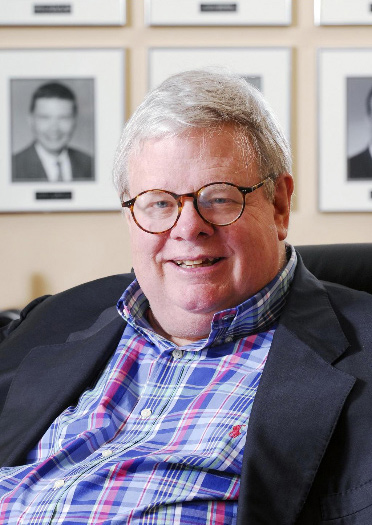 Many students dread studying history, thinking it has no bearing on their lives in the present.
Many students dread studying history, thinking it has no bearing on their lives in the present.
McKee Nunnally ’65 knows differently.
Nunnally, who earned his bachelor’s degree in history at UNC, has applied the lessons he learned in U.S. and British history to his career in business. The Atlanta, Georgia resident is a retired executive from the investment industry spanning 42 years.
Passion for History
Nunnally describes his experience at Carolina as a good one. He came to Chapel Hill having never been away from home, but he joined the Sigma Alpha Epsilon fraternity and quickly made friends.
Inspired by his high school American history teacher and mentor Emmett Wright, Nunnally also found a home in the department of history.
Three UNC professors who took history to a new level for Nunnally stand out in his mind: Frank Klingberg, who taught American history; James Godfrey, who specialized in Victorian English history from 1837-1901; and Stephen Baxter, who taught English history during the Tudor-Stuart period.
Nunnally remembers Godfrey as a “brilliant master of details.”
“He had all of the minutia down,” Nunnally said. “He knew all of the small things, like who the policemen, the bobbies, were named for. He made it interesting and fascinating for everybody. We even took the final in his course on January 22, which also happened to be the same date Queen Victoria died in 1901. I put that on my test, and he loved it!”
He recalls that Baxter was able to humanize that era of history, particularly with Henry VIII, encouraging students to visit where he lived, which Nunnally did when he was traveling in England.
“The central thing that each of these teachers did that helped you understand each era was that they humanized it—they portrayed the figures—whether it was Lincoln, Teddy Roosevelt, Henry VIII or Queen Victoria—as real people,” Nunnally said.”
Classroom to Career
The lessons Nunnally learned in his history classes at UNC laid the foundation for his business career.
“The professors had a base of knowledge that conveyed the fact that these were real people doing real things,” he said. “When you went to England, you could visit and see where they lived. It helped to understand that in business, it’s not about computers, but it’s the people who run the computers and who run the businesses. It’s the relationships that people have with each other that are so critical.”
Nunnally has also seen sometimes-ruthless similarities in the history he learned and what he has experienced during his years in the workforce.
“What helped me most was understanding the people relationships, especially in the era of {William Ewart} Gladstone and {Benjamin} Disraeli under Queen Victoria,” he said. “Henry VIII was pretty brutal with people around him, and in the era I went through in the 1970s in the investment business, we didn’t behead people, we just put people out of business.”
His history degree provided the human aspect of business that the more technical side could not.
“When I got to Stanford {University} to work on my MBA, I saw a tremendous focus on academia and quantitative analysis,” he remembers. “It was very important to integrate the quantitative analysis with the people approach. You had to be able to express yourself to people at their level, on their subject if you wanted to be successful in terms of setting up and running a sales department. Sales is people—being able to understand people and being able to relate to them.”
He credits Queen Victoria as one of the best examples of this in history.
“You can see it now on TV,” he said. “She was head of a great empire.”
Returning Thanks
In gratitude for the influence that Carolina had on his life and career, Nunnally established an endowment fund to support faculty and graduate students in the department of history.
“Chapel Hill was an integral part of setting me free in terms of academia and letting me find where my interests were,” he said. “My wish is very simple—to return thanks to a department that made a difference in my life. You can’t be effective if you diminish your resources. If you allocate your resources to too many areas, it won’t help a specific area enough, so I’ve chosen one area.”
Given the significance of the past affecting the present, he wants today’s students to learn as he did.
“The history department should strive to continually update their offerings of courses to match what the students have an interest in,” Nunnally said. “European history in general is important. Russian history as well. I took that course because of what was going on at the time—the Cold War. I would think Chinese history would be important now. They will be our top competitor economically and politically in the next 100 years, so our students need to have an integral knowledge of China. It’s important to react to what’s going on currently.”
